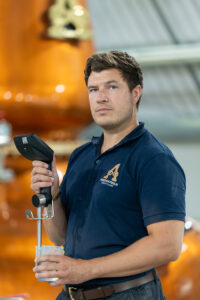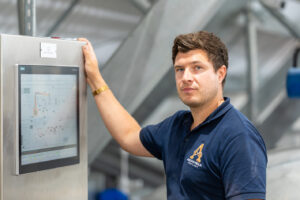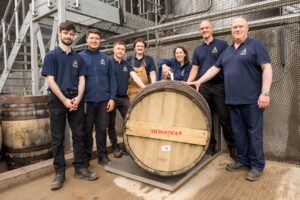Read our Q&A with Harry, one of our Operators
26th August 2025
Our Operators are a crucial part of the whisky-making journey. This interview is with Harry, who’s a founding member of our operations team. He has 10 years of industry knowledge and some interesting perspectives on what it’s like being an operator at Ardgowan Distillery.
How long have you been working in whisky?
“I mean, technically, I’ve been in the industry for 10 years. I started at Kilchoman, but I was more of a seasonal production worker, so it wasn’t really as hands-on as I am now. I was working in the bottling hall and on the malt floor; tasks like that. I was pretty much an all-rounder! Next, I moved back home, and I worked for Scottish Whisky Auctions. It was an interesting part of the whisky world; I learned more about consumers and what they like, and of course, shipping bottles all over the world. I did that for a few years and was also doing things like marketing and photography for them. Then I moved to Ardgowan, and I’ve been here for 6 months.”
How did you get into distilling?
“I got into distilling by chance; you’ll find that with a lot of people in the industry. I moved to Jura when I was 18. I was working in a bar there, so I met people from Jura Distillery just across the road. That was my first introduction to whisky, and a few years later, I was still in touch with those people. I had travelled a bit first, but a job came up at Kilchoman Distillery through a friend from Jura. So that’s how I got involved. Once you’re in, it’s very easy to get invested in the industry as a whole. I always liked whisky, I’m proud of it, and I like what it does for Scotland. Especially here at Ardgowan, I think it’s a positive thing for the area. Inverclyde has had a tough time of late, so I think we’ve given the area a bit of a lift. Along with the other operators and me, we’ve just opened our Visitor Centre, which has brought more jobs to the area. We have big plans… we’re just getting started!”

What makes Ardgowan stand out?
“There are a few things! I think the fact that we’re heavily Sherry cask-influenced is a unique thing for a Lowland distillery; they are usually very light and fruity, easy-going whiskies. You don’t tend to find them producing a robust spirit and Sherry-driven as the plan for Ardgowan is. Obviously, the development of the Infinity Cask, a bespoke cask for just Ardgowan, is really unique – we’ve had thousands of these casks laid down in Sanlúcar De Barrameda for years in anticipation of our new make spirit. The area itself as well, especially as we’re the first new distillery in Inverclyde for over a century.”
What happens to the byproducts?
“In terms of the main byproducts, we have heat exchanger technology, so we capture and reuse heat as much as possible. Obviously, we use the residual heat in the pot ale to heat the wash still, and we use the spent lees to help charge the spirit still. We also have a Thermal Vapour Recompression (TVR) system, allowing us to reuse steam. It’s a good efficiency technology that we have. In addition to these heat recovery efforts, we also convert our pot ale into biofuel via anaerobic digestion, and the waste product from our malt, called grist, is used as cattle feed.”
Once in operation, how many cases do you expect to produce per year?
“I’m not sure how many cases. Obviously, with Ardgowan, the plan is for long maturation, especially when using the Infinity Casks. I believe the plan is to produce up to 800,000 litres of pure alcohol every year. This year, we’re obviously just beginning, so we won’t be hitting that level just yet. In terms of cases, that would be around 26,000 cases in 12 years’ time… but we need to hold some back for Ardgowan 15yo, 18yo, and maybe a 30yo in time for my retirement!”
What sizes of cask do you use?
“Right now, we are only filling Infinity Casks and hogsheads. We can’t disclose the size of the Infinity Casks; it’s an industry secret! But I can say they are absolutely massive and put our forklifts to the test. They are fun to deal with because they are so big. I mean, it’s the biggest cask I’ve ever dealt with. They are actually very nice to work with; they’ve got big bellies, but the top and bottom faces are also quite large so they aren’t like Sherry butts that can kind of get away from you. They are very steady. The Infinity Casks and hogsheads that we’re filling at the moment are both Sherry casks, and a mix of Pedro Ximénez (PX) and Oloroso Sherry. The hogshead holds 250 litres of alcohol.”
How often are samples collected?
“When we are distilling, we are constantly sampling and assessing the ABV. That’s when we know our cut points: when to move onto the ‘heart’ run from the ‘head’, and when to come off it for the ‘tail’ to run through. We sample the wort and wash to measure the gravity, which allows us to assess the conversion efficiency. This tells us how well the starches have turned into fermentable sugars, and then how successful the yeast has been in fermenting those into alcohol. Our Distillery Manager, Laura Davies, also has us sampling the older casks for our Clydebuilt range to see how they’re developing; it’s not that often that we sample them, maybe a couple of times a year, but they’re in our dunnage warehouses, so it can be a lot of work to get samples drawn!”
What’s a typical day like?
“It chops and changes a lot for the operators. We’re a small team, and we’ve obviously just started distilling a few months ago, so we’re in charge of the whole process. We literally receive the malt, mash it, ferment it, distil it, cask it, and warehouse it all ourselves. Our job can essentially be designated into one or more of those jobs each day. Every day is different, depending on what the plan is and what Laura wants from us that day or week. I like it all; there is no part of the process that I don’t enjoy, and they all have their benefits. You can have a semi-relaxing day if you’re on the late shift, which typically means you’re just distilling, or you can have a chaotic, full-of-energy day if you’re warehousing and things like that. That’s what I like about the job, at this point, a lot is going on, and it’s exciting. It’s cool to see us filling these warehouses with something we’ve created; it’s just annoying that we have to wait so long for someone to try it!”
 What’s it like being part of the founding operations team here?
What’s it like being part of the founding operations team here?
“It’s really cool. That’s another quite unique thing. Ardgowan doesn’t have the history that some other distilleries have yet, which you could see negatively when comparing us to some well-established whisky companies; however, the good thing is that we’ve started in a very modern way, like we discussed earlier about efficiency and reusing heat and byproducts. There are a lot of old distilleries that can’t put these processes into old buildings, or they feel like they can’t change deep-rooted processes now. In contrast, Ardgowan has the advantage of being a new distillery, so we can bring in those processes from the start. I love seeing the old photos of workers when distilleries started, so being part of that now is very cool. We all started around the same time, so we’re in the same boat as a team. It’s nice to grow together as a team and as a company.”
How does it feel to be part of the Infinity Cask process?
“It’s exciting, I mean, the Infinity Cask is the only new design of cask for a century. It’s a brand new, innovative design. You don’t usually get distilleries that invent their own cask and lay them down years before they’ve even built the distillery! I remember when they arrived, I knew they were going to be big, but I didn’t know they were going to be quite as big as they actually are! From previous roles, I was familiar with working with smaller casks. A lot of start-up distilleries will purposely use smaller casks as they mature faster due to the increased wood contact with the smaller volume of spirit. I find it cool that Ardgowan took the risk and substantial investment to have the European oak long maturation plan from the start. It’s expensive, but we’ve set out our stall on the style of whisky we wish to produce, and we won’t compromise on that.”
Are you a whisky drinker? If so, what kind of whisky do you drink?
“Yes, I am a whisky drinker. I am kind of a seasonal whisky drinker. If it’s during the summer, I like something from Speyside, heavily Sherried. I never drink peated whisky during the summer, just for me, I think it feels wrong. I drink more Islay malts in the winter. Something in my brain tells me when it’s summer, you want something light and fruity and less heavy and oily. I love all whisky. I think most of the whisky you find is decent. I rarely try something and think it’s terrible. If it’s made it onto a shelf, then it’s typically been through several selections. I’m not really a snob about it; I can enjoy a £20 blend as much as I can enjoy a £500 Single Malt.”
What’s your favourite moment working at Ardgowan so far?
“I’ve had loads of brilliant wee days. It’s a nice area to work; it’s quiet and feels like the countryside. I would probably say the Opening Day on 20th June was something different. We’re used to working on this site, where there are five operators and a very small office team. Occasionally, we’ll get the odd contractor coming in. The Opening Day was cool as the site went from very quaint and quiet, to suddenly 5,000 people storming the gates, bands are playing live music, and tastings are going on. I would say, as an outstanding memory, that day was something a bit different, had good energy, and the weather was amazing.”

Thank you to Harry for sitting down and sharing some of his insights about Ardgowan, his role, and the whisky-making process. If you would like to see it for yourself, why not join us on a tour? Find out more here.